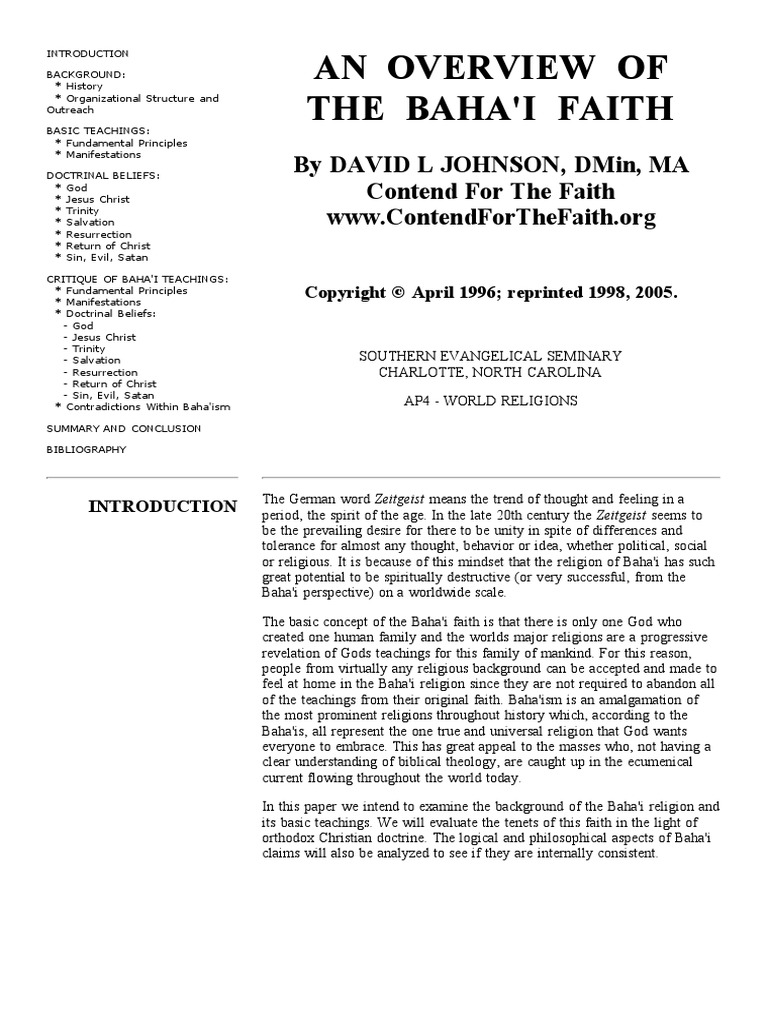The Baha’i Faith, emerging from the tumultuous backdrop of the 19th century, offers a distinctive worldview that recognizes the interconnectedness of all humanity. Its teachings encapsulate a profound desire for unity, spirituality, and the elevation of the human condition. Understanding what sets the Baha’i Faith apart requires an examination of its core principles, historical context, and the multicultural tapestry that informs its doctrines. The following exploration elucidates the key elements that contribute to the unique identity of the Baha’i Faith.
At the heart of Baha’i teachings lies the principle of oneness. Baha’is contend that humanity is fundamentally one, transcending artificial divisions such as race, nationality, and class. This radical notion revolutionizes the conventional understanding of identity. The Baha’i Faith posits that diversity is a multifaceted expression of a singular human family, emphasizing the intrinsic value of every individual. This doctrine fosters a paradigmatic shift, compelling adherents to not only appreciate differences but to actively embrace them as vital to the collective human experience.
In conjunction with the principle of oneness is the Baha’i commitment to the elimination of prejudice. The Baha’i teachings posit that prejudice in all its forms impedes progress and stifles the inherent potential of individuals and communities. Thus, Baha’is are encouraged to cultivate an environment of acceptance and inclusivity, where diverse perspectives are not merely tolerated but celebrated. This perspective cultivates social harmony and collective advancement, contributing significantly to the Faith’s broader mission of establishing a peaceful global society.
Another distinguishing characteristic of the Baha’i Faith is its emphasis on the harmony of science and religion. Unlike many belief systems that present these domains as antithetical, Baha’is assert that true science and authentic religion ultimately converge in their pursuit of truth. This synthesis challenges the reductionist tendencies of modern secularism while providing spiritual insight that enhances scientific inquiry. The Baha’i perspective advocates for a comprehensive understanding of reality, prompting adherents to navigate the complexities of existence with both empirical inquiry and spiritual reflection.
The Baha’i Faith also introduces a unique administrative order, which operates on principles of consultation and collective decision-making. Absence of a clergy ensures that spiritual leadership is not concentrated, fostering a culture of shared responsibility among followers. This structure empowers individuals at all levels to engage in the decision-making process, harmonizing spiritual and administrative duties. This model not only promotes democratic engagement but also enhances a sense of community, wherein every voice is deemed valuable and worthy of consideration.
Moreover, the Baha’i Faith encourages a progressive vision of social justice. Adherents are urged to advocate for the rights of all, particularly marginalized communities. This commitment stems from the belief that the establishment of justice is a prerequisite for genuine peace. The Baha’i teachings promote active participation in social transformation through education, economic development, and advocacy efforts. The Faith’s global perspective entails an understanding of interdependence, where justice for one community enhances the well-being of all.
Integral to these principles is the Baha’i understanding of God and revelation. Baha’is believe in a progressive revelation—a concept that posits the existence of God as a loving and guiding force in human affairs. This perspective re-evaluates historical religious narratives, framing them not as isolated phenomena but as part of a divine continuum that unfolds through various manifestations. Foundational figures such as Jesus, Muhammad, and Baha’u’llah (the founder of the Baha’i Faith) represent this revelation’s evolution. Consequently, the Faith encourages tolerance and respect for all religions, inviting adherents to glean wisdom from diverse spiritual traditions.
In exploring the Baha’i commitment to education, one uncovers another dimension of its distinction. Baha’is regard education as a fundamental human right and a critical vehicle for empowerment. The Faith advocates for both spiritual and material education, emphasizing the development of moral virtues alongside intellectual capacities. The Baha’i approach to education espouses a holistic view that encompasses character development, encouraging individuals not only to seek knowledge but also to translate it into meaningful action for the betterment of society.
The concept of life after death, while commonly addressed in various religious traditions, assumes a unique interpretation within the Baha’i Faith. Adherents believe in the continuity of the soul and its progressive journey toward spiritual fulfillment. Unlike doctrinal assertions of Heaven and Hell, the Baha’i view emphasizes spiritual states achieved through earthly actions and choices. This intrinsic connection fosters a comprehensive understanding of accountability, urging individuals to lead lives of virtue, service, and commitment.
Moreover, the Baha’i Faith actively engages with the pressing issues of the contemporary world, such as climate change, conflict resolution, and gender equality. Baha’is are encouraged to contribute towards solutions that embrace sustainability and equity, reaffirming the Faith’s relevance in addressing global challenges. This proactive stance is indicative of a broader mission—recognizing that the well-being of each individual is interwoven with the health of the planet and the prosperity of society as a whole.
As the Baha’i Faith continues to grow and thrive across diverse cultural landscapes, its distinct teachings resonate with an increasing number of individuals seeking a more unified approach to spirituality and social justice. The integration of principles such as oneness, the harmony of science and religion, and the commitment to justice positions the Baha’i Faith as a beacon of hope in a polarized world. Ultimately, its teachings encourage individuals to embark on a transformative journey toward both personal and collective fulfillment, grounded in the belief that humanity is capable of rising to its highest potential through unity and love.
